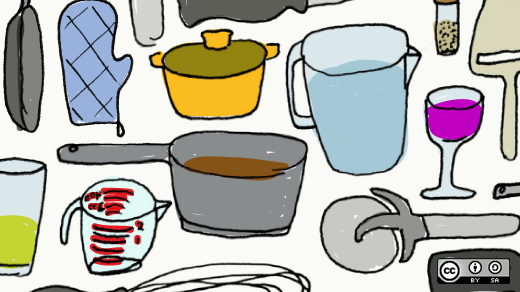The secret ingredient
It's a Sunday afternoon and I've got no idea what's for dinner. The supplies from the week's earlier grocery trip have dwindled. What's left? A bit of mashed potato. A head of cauliflower. A couple of pieces of breakfast sausage. Some wilting spinach. What to do?
Here's what to do: Hit the web. My current favorite resource (and recipe sites are like rock songs, your favorite can change with each new album) is Tasty Kitchen*, billed as a "happy cooking community." Community. Hmm.
I pop onto the site, enter the few ingredients (read: leftovers) I have on hand, and then hit search. What does it bring me? A bunch of recipes, most containing one or more of the ingredients I listed. I choose one, and--supper dish dilemma solved. How did we ever know what to cook before? (And for that matter, how did we ever resolve Trivial Pursuit disputes? But perhaps this is only a problem in my family.)
Twenty years ago, when I was learning to cook, solving the "secret ingredient" challenge was fairly simple. My mom has an enormous book, a mish-mash of typewritten and hand-written, cut-outs and index cards, all stuffed in a ring-binder, organized in loose sections--"desserts," "casseroles," "veggies." But more importantly, Mom had her own mental index--one look in the pantry and she'd mentally calculate. Leftover chicken? One onion, half a pepper, and a cup or two of peas? Ding! Chicken Curry. But that was experience bourne of a dozen years of regular meal-making--and it was limited to her collection of recipes.
Now, my search still involves a mental search through my own ring-binder, but when that comes up empty--or I want something outside my expertise--the solution is simple. And that never would have happened without the wildfire popularity of blogging and the many online, open, community-based conversations that revolve around food--already-prepared or preparing it, photographing it, analyzing and reviewing it.
Why such interest? I have a few guesses.
Everybody's a critic
Everyone who's ever read a food critic's column with regularity (and a shout out here to my local food critic, Greg Cox, who I follow faithfully) imagines the critic's job is a savory one. "What I wouldn't give..." we say, "...for a job like that." As the saying goes, everyone's a critic. Anyone who eats--and that's everyone--knows what they like and they don't. Anyone who cooks, knows what they like to make, and what other people like to eat.
Good recipes--like a lot of things--are something we're usually happy to share. We take our most delicious creations to potlucks and barbecues, and the greatest compliment is being asked for the recipe. We share other food knowledge too--the same way a critic does--recommending spots with great food and service, or warning friends against places that aren't making the grade.
There have always been formal groups of food enthusiasts--supper clubs, recipe swaps, the good old-fashioned church cookbook. But, like your personal recipe collection, those are limited by access and volume. You can only buy so many cookbooks, and printed books are hard to search. (Protip: Post-it Notes. Color coordinated tabs for your cookbooks.) And now, anybody with a internet connection and a stove can be the world's next food blogger. There are recipes everywhere. But what happens after that?
Crowd-sourcing the cookbook
Two things happened. One, the internet grew up. Simple text applications gave way to tools with more complex functions and even simpler interfaces. Setting up a multi-user blog, a discussion board, or a library of searchable data became ridiculously easy. And two: the once-isolated blogs--the ones started to share info with just a handful of friends--began to cross-pollinate. Successful blogs linked to other blogs, making them successful too. As their hosts added features--comments, discussions, contests, polls--people began to identify themselves and identify with others. They worked together to create both networks and aggregates. And these joint projects, like Tasty Kitchen, contain far more information than a single-sourced project.
And cooks like Ree Hammond (better known as "Pioneer Woman") ended up blog big-shots by offering very simple things. Good recipes, with concise instructions, fantastic pictures, and the occasional video.
Wait--pictures and video?
Crowd-sourcing and technology brought diversity and volume, as well as the ability to manage it. But technology also has other benefits over Mom's cookbook**. If you take a good tour of the most popular food communities online, you'll find that they have a lot in common. The recipes are good, of course, and the instructions clear. But they also all have at least some element of multimedia--whether it's dozens of prep shots (far more than you could fit in a printed book) or video instructions.
Technology allows for massive geographic and ethic diversity, the use of mixed media, shared ownership, and collaborative effort. All things that strengthen and enrich communities and produce more diverse results with nearly-infinate depth--the great benefits of crowd-sourcing.
But what about... copyright?
One of the things that's assumed--in all this recipe swapping and sharing--is that the recipes used aren't under copyright. One of the dangers of very open communities is that they can be tainted by works used without license. Recipes that are published in books or even by websites that have restrictive copyrights shouldn't be republished or repurposed.
The US Copyright office defines what kinds of works constitute copyrightable recipes:
"Mere listings of ingredients as in recipes, formulas, compounds, or prescriptions are not subject to copyright protection. However, when a recipe or formula is accompanied by substantial literary expression in the form of an explanation or directions, or when there is a combination of recipes, as in a cookbook, there may be a basis for copyright protection.
"Protection under the copyright law (title 17 of the U.S. Code, section 102) extends only to “original works of authorship” that are fixed in a tangible form (a copy). “Original” means merely that the author produced the work by his own intellectual effort, as distinguished from copying an existing work. Copyright protection may extend to a description, explanation, or illustration, assuming that the requirements of the copyright law are met.
"Copyright protects only the particular manner of an author’s expression in literary, artistic, or musical form. Copyright protection does not extend to names, titles, short phrases, ideas, systems, or methods."
(Source: US Copyright office, http://www.copyright.gov/fls/fl122.html)
But, much like with software, the code doesn't answer questions about how much of a recipe constitutes the work, or what qualifies as "substantial" expression. Add to this the nature of recipe swaps and you might never realize Great Aunt Ida's Potato Gratin is really a recipe originally from an Alton Brown cookbook.
Keep on cooking
So, what to do? Well, if you're someone who runs a cooking blog, or participates in a cooking community, make sure your contributions are unencumbered and copyright-free.
You can even go a step further, and license your original contributions through Creative Commons (we'd suggest BY-NC-SA at least), thus protecting their sharability, now and in the derivative future.
Support blogs that provide original content from real people; check carefully when you see cooking or recipe contests crop up. Many encourage you to submit original works, but the second you do, they become property of the contest sponsor--often a corporation or commercial interest. Competitions like Food52--which sounds like a promising, open recipe contest at first review--is really just a clever cover for a publishing company that wants to put together a recipe book without having to pay any actual authors.
But, take heart--those kinds of sites seem to be the vast minority, and they're usually easily identified. Take a peek at their T&Cs, or the legal language around their submission guidelines. Don't be tempted by the promise of "prizes" or "getting published"--you already possess the power to publish yourself and the prizes aren't usually that great anyways.
Oh, and one more thing--open source innovation doesn't just extend to the cooking blog. SourceForge has more than one "recipe organizer"--just like my mom's big binder--that brings the ease of use of the web apps to your very own collection.
Man, what a great time to be a geek in the kitchen!
* Tasty Kitchen is an offshoot of a popular blog run by a lady known to her fans as "Pioneer Woman." If the name sounds familiar it's probably because you've seen her in other places--her face, family, and Oklahoma-ranch life have decorated the pages of magazines, been on TV, and recently she released her first cookbook. She's not the first--nor the last--blogger to get picked up by a publishing house, or find commercial sponsorship for what was, at the outset, a hobby. Other popular blogs--on many topics--garner their owners "real" credibility: Donal Skehan's Good Mood Food Blog became the Good Mood Food Book, Heather Armstrong's sarcastic blog Dooce paved the way to two books (so far) and a host of advertising opportunities, and there's the perennial holiday gift favorite Postsecret. Bakerella made it onto Martha Stewart and behind-the-scenes at Betty Crocker. Even niche topics--like Jennifer McCann's Vegan Lunchbox (which contains simple directions for wholesome, healthy vegan and allergen-sensitive bento-box-like lunches for children) make it into book form, and garner the interest of readers and subscribers. Bottom line--many food enthusiasts online are every bit as qualified as their published counterparts--in many cases, they're one and the very same.
** Mom, I'm not dissing The Cookbook. Please still leave it to me in your will. Please?
Resources:
Tasty Kitchen:
http://thepioneerwoman.com/tasty-kitchen
Foodista:
http://www.foodista.com/
Food52:
http://www.food52.com/
Tastecasting (Crowdsourcing)
http://www.tastecasting.com/reviews/
the open source cookbook (ibiblio)
http://www.ibiblio.org/oscookbook/
Open source recipe managers:
Grecipe
http://grecipe-manager.sourceforge.net/
PHPRecipeBook
http://sourceforge.net/projects/phprecipebook/files/
KRecipes
http://krecipes.sourceforge.net/?p=about







3 Comments